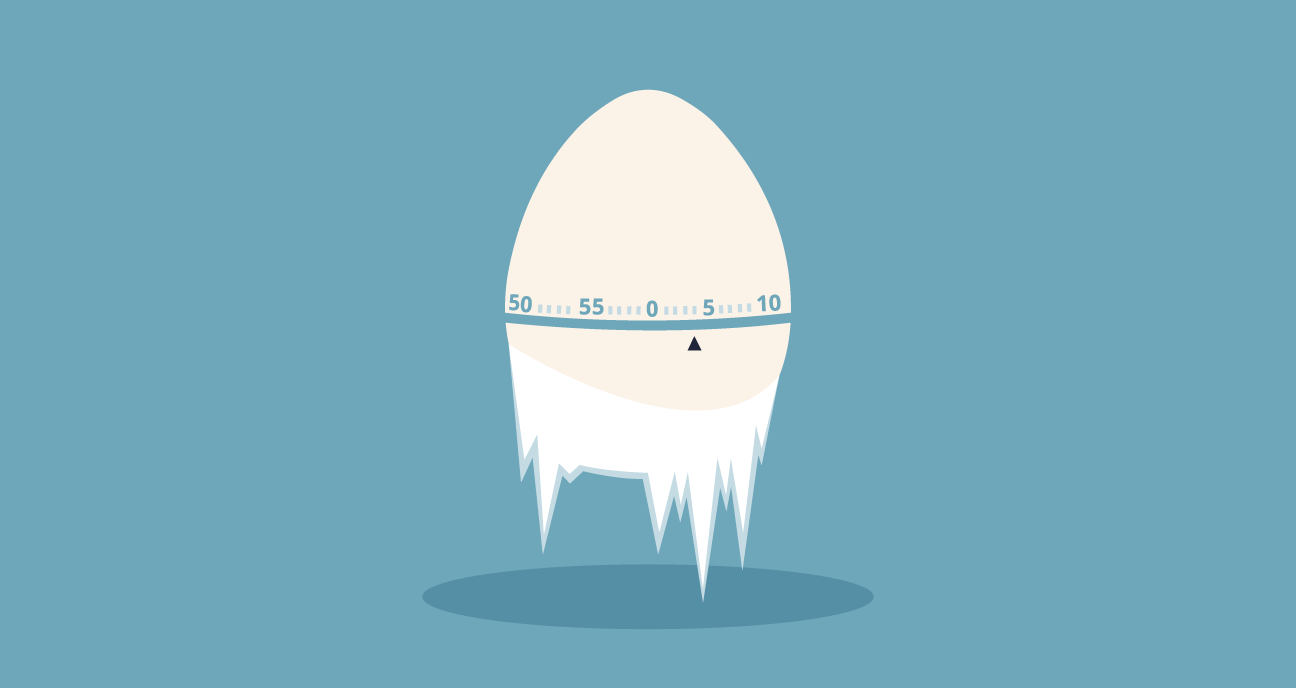Egg Freezing 101: Process, Benefits, Risks, and Cost

You’re thinking about freezing your eggs, but aren’t sure what's involved. Let’s go over what egg freezing involves, the various costs, and how to determine if it’s the right path for you.
6 Second Snapshot
- When you freeze your eggs, you’re actually completing the first part of the in vitro fertilization (IVF) process!
- You will use medications to stimulate your ovaries to produce many egg-containing follicles. The eggs will be retrieved during a simple, outpatient procedure and then cryopreserved.
- Whether you’re sure you want to freeze your eggs or simply considering it, the first step is to get your baseline fertility tested.
Should I freeze my eggs?
Egg freezing is an increasingly popular way to preserve your fertility! In fact, according to member clinic data collected by the Society for Assisted Reproductive Technology (SART), there were 31% more egg-freezing cycles in 2021 than the year before.
There are many reasons why you might freeze your eggs, including:
You want to preserve your fertility
Because egg quality declines with age, egg freezing is a way to preserve higher quality eggs for a pregnancy attempt at a later time.
You have diminished ovarian reserve
Diminished ovarian reserve (DOR) occurs when your ovaries produce fewer eggs than expected for your age. While research shows that DOR doesn’t impact the quality of your eggs (1), it can make it more difficult to get pregnant since there are fewer of them.
You have a family history of early menopause
Preserving your eggs early allows you the flexibility to build a family on your timeline, even if menopause shortens your reproductive years.
You plan to undergo gender-affirming treatment
If you plan to undergo gender-affirming surgery that involves the removal of your ovaries, freezing your eggs before starting treatment can ensure that you have a chance to have a baby later in life. If you plan to undergo gender-affirming hormone treatment that involves taking testosterone, egg freezing beforehand ensures that you don’t have to stop taking hormones in order to restore function to your ovaries if you wish to grow your family.
You plan to undergo treatment that may affect your fertility
If you are planning to undergo chemotherapy, radiation, or another treatment that may affect your fertility, freezing your eggs ahead of time can ensure that you have unaffected eggs before beginning treatment.
Whether you’re considering egg freezing or ready to begin, it’s helpful to know what to expect throughout the process.
First steps before starting the egg freezing process
Get your baseline fertility tested
The very first step toward freezing your eggs is getting your baseline fertility tested. A simple blood test to measure the amount of anti-müllerian hormone (AMH) in your blood will help your clinician understand how many eggs remain in your ovaries (your ovarian reserve). You can ask your OB/GYN to order an AMH test, order an over-the-counter AMH test kit, or go to certain walk-in labs to take an AMH test without a doctor’s order. Testing your AMH is also a good step to take if you are just egg-freezing-curious!
While AMH is one of the first and most important tests to take to understand your fertility potential, it is best understood within the context of other fertility tests. These include testing the amount of follicle stimulating hormone (FSH) in your blood, and taking an antral follicle count (AFC), which is measured via an ultrasound.
Whether you are under the care of your OB/GYN or a fertility center, your clinician will be able to assess your fertility potential along with any conditions you may have that could affect your fertility. Together, these tests could help you decide whether egg freezing is the right choice for you, help you set expectations for what the process will be like, and anticipate how many eggs you might retrieve.
Choose a fertility center
It can feel intimidating to take the step of contacting a fertility center and starting your egg freezing journey. It’s absolutely okay to take time to research and contact different fertility centers in your area to ensure that they meet your needs and that you feel comfortable with their approach.
Some things to consider include:
- What are their success rates?
- Do they take patients with your particular diagnoses and do they have a record of success with those patients?
- If you are LGBTQIA+, do they have a history of being sensitive to and meeting the needs of LGBTQIA+ patients?
- Do you feel comfortable, informed, and cared for in your interactions with the clinic?
- What tools do they have to support patients and communicate with them?
- Do they offer financial packages that fit your needs, such as a flat rate for a number of eggs or financial support options?
With these tests and decisions under your belt, it’s time to begin the egg freezing process!
The Egg Freezing Process
When you freeze your eggs, you’re actually completing the first part of the IVF process! During the first phase of IVF, your clinician will stimulate your ovaries with medications to produce many follicles and retrieve the eggs. The difference is that rather than fertilizing the eggs and transferring an embryo back into the uterus, you are freezing them for later use. In other words, if you freeze your eggs now, you will need to continue the IVF process at a later date if you want to use those eggs to achieve a pregnancy.
Here are the steps to the egg freezing process:
Step One: Ovarian Stimulation
During a typical menstrual cycle, your body produces many egg-containing follicles. However, only one egg (also known as an “oocyte”) usually grows to maturity and can be ovulated. The process of ovarian stimulation during the egg freezing process involves the use of hormone medication injections to develop more of those follicles to maturity while controlling ovulation.
Step Two: Egg Retrieval
Once several of your follicles have reached 18-22mm in size, your reproductive endocrinologist (RE) will retrieve your eggs in a simple outpatient procedure. You will undergo sedation during the procedure, and the procedure should be painless.
Step Three: Egg Maturity Verification
In the lab, an embryologist will check each retrieved egg to ensure that it has reached maturity, meaning that it has shed half its chromosomes in a process called “meiosis.” Then the embryologist will carefully cryopreserve all your mature eggs and place them into storage.
If and when you are ready to fertilize your eggs, they will be thawed, fertilized, and cultured in a lab as they grow into embryos for 3-7 days. Once they are graded (assessed for quality), the resulting embryo or embryos can either be frozen again or transferred to your uterus.
It’s important to note that the number of follicles your RE counts on your ultrasound will likely not be the same as the number of mature eggs they retrieve. This is because IVF involves a complex set of procedures on delicate cells, so some eggs or embryos are lost at each step of the process. This is sometimes referred to as the “IVF funnel.” As a result, the number of eggs your clinician retrieves will be greater than the number of viable embryos created through IVF with those eggs, and not all those embryos are expected to implant. This is why your clinician hopes to optimize the number of eggs that they retrieve from your ovaries. More eggs give you a greater chance of creating multiple viable embryos, each of which increases your chance of having a baby.
Side Effects to Egg Freezing
While you are administering ovarian stimulation medications and your estrogen is higher, you may have more energy. You may also experience some pain and bloating due to enlarged ovaries. After egg retrieval, you may experience tiredness, nausea, acne, weight gain, breast tenderness, and/or bloating.
Ovarian stimulation can also result in ovarian hyperstimulation syndrome (OHSS), an uncomfortable and potentially dangerous condition that may occur if you developed a large number of follicles (more than 20) and/or had high estrogen levels before the egg retrieval procedure. Current ovarian stimulation medication protocols have mostly eliminated OHSS, which causes fluid to build up in the abdomen. Still, if you are experiencing bloating, constipation, reduced urinary output, and/or abdominal pain after egg retrieval, you should contact your fertility care team.
Side effects of ovarian stimulation should go away with your period, which should occur 1-2 weeks after your egg retrieval procedure.
Egg freezing cost
Egg freezing is a costly procedure. The overall cost includes frequent blood work, ultrasounds, the egg retrieval procedure (including anesthesia), and embryologist fees, as well as the cost of your hormone medications. As a result, a single round of egg freezing can cost between $6,000-20,000, depending on your clinic.
Another cost you must take into consideration are storage fees. These can run up to $1,000 per year. You can talk to your clinic to see if they offer a multi-year storage discount or can move your eggs to a less expensive storage facility.
This can be disheartening news, but there are options available to you.
While egg freezing is generally considered an elective procedure, you should check with your health insurance ahead of time to see if some or all of the cost of egg freezing/IVF is covered.
You can also see if there are discounts available through your fertility clinic for medications, grants you can apply for, or financial plans to make egg freezing more affordable.
Because costs can be prohibitive, when you are choosing a clinic, you shouldn’t hesitate to ask about the various costs involved and what measures they take to help make egg freezing more affordable.
What’s the benefit of freezing my eggs now vs. later?
A major factor in IVF success is your age when your eggs were retrieved. This is so much the case that your chance of success with IVF (the likelihood that you will have a live birth) is measured by your age when your eggs were retrieved, not your age when they are transferred.
Because fertility declines with age, many doctors suggest that you freeze your eggs while your egg quality is still very good and you have a greater ovarian reserve. However, you may be thinking about the cost vs. benefit of freezing your eggs now rather than later. One study found that freezing your eggs at age 37 gave you the best improvement in the probability of live birth (51.6%) vs. waiting to try naturally later in life (21.9%) (2). It may also reassure you to know that a study published in 2022 found that 70% of patients who were younger than 38 when they froze their eggs (and froze at least 20 eggs) had a baby (3). This is especially reassuring since most people freeze their eggs when they are in their late thirties.
Since everyone’s body is different, consulting with your OB/GYN or a fertility specialist about your fertility and getting basic fertility tests conducted will help you understand your chance of success and determine the right timing for you.
Recent Articles
References
-
Fouks, Yuval, et al. “A Diagnosis of Diminished Ovarian Reserve Does Not Impact Embryo Aneuploidy or Live Birth Rates Compared to Patients with Normal Ovarian Reserve.” Fertility and Sterility, vol. 118, no. 3, 1 Sept. 2022, pp. 504–512, www.fertstert.org/article/S0015-0282(22)00386-7/fulltext, https://doi.org/10.1016/j.fertnstert.2022.06.008. Accessed 2 Feb. 2023.
-
Mesen, Tolga B., et al. “Optimal Timing for Elective Egg Freezing.” Fertility and Sterility, vol. 103, no. 6, June 2015, pp. 1551-1556.e4, https://doi.org/10.1016/j.fertnstert.2015.03.002. Accessed 4 June 2019.
-
Cascante, Sarah Druckenmiller, et al. “Fifteen Years of Autologous Oocyte Thaw Outcomes from a Large University-Based Fertility Center.” Fertility and Sterility, vol. 118, no. 1, 1 July 2022, pp. 158–166, www.sciencedirect.com/science/article/pii/S0015028222002540, https://doi.org/10.1016/j.fertnstert.2022.04.013. Accessed 21 Oct. 2022.
Share this
Recent Articles

Learn everything you need to know about IVF
Join the newsletter for IVF education, updates on new research, and early access to Alife products.



